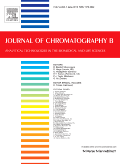
JOURNAL OF CHROMATOGRAPHY B-ANALYTICAL TECHNOLOGIES IN THE BIOMEDICAL AND LIFE SCIENCES
Scope & Guideline
Advancing Analytical Excellence in Biomedical Research
Introduction
Aims and Scopes
- Chromatographic Method Development:
The journal emphasizes the development of new chromatographic methods, including high-performance liquid chromatography (HPLC), ultra-high performance liquid chromatography (UHPLC), and gas chromatography (GC), tailored for various applications in biomedical research and life sciences. - Analytical Application in Pharmacokinetics:
A significant focus is placed on the pharmacokinetic studies of drugs, where chromatographic techniques are utilized to quantify drug concentrations in biological matrices, aiding in therapeutic drug monitoring and clinical studies. - Metabolomics and Profiling:
The journal explores the application of chromatographic techniques in metabolomics, providing insights into metabolic pathways and biomarker discovery, which are crucial for understanding disease mechanisms and treatment effects. - Environmental and Food Safety Analysis:
Research related to the analysis of contaminants, pesticides, and residues in food and environmental samples is a key area, showcasing the application of chromatography for ensuring safety and compliance. - Innovative Extraction Techniques:
The journal also highlights novel sample preparation and extraction techniques that enhance the sensitivity and specificity of chromatographic analyses, thereby improving overall analytical performance.
Trending and Emerging
- Integration of Mass Spectrometry:
There is a significant trend towards coupling chromatographic techniques with mass spectrometry (MS), particularly in LC-MS/MS applications. This integration enhances sensitivity and specificity for a wide range of analytes in biological and environmental samples. - Focus on Metabolomics:
Metabolomics is increasingly becoming a central theme, with studies exploring metabolic profiles related to various diseases and therapeutic interventions. This trend underscores the importance of understanding metabolic changes in health and disease. - Advanced Sample Preparation Techniques:
Emerging methodologies in sample preparation, such as solid-phase microextraction (SPME) and deep eutectic solvent extraction, are gaining traction. These techniques improve extraction efficiency, reduce solvent usage, and enhance the overall analytical workflow. - Nanotechnology Applications:
The use of nanomaterials in chromatography, particularly for the development of novel stationary phases and sorbents, is on the rise. This trend reflects the ongoing pursuit of improved separation efficiency and selectivity. - Environmental and Food Safety Research:
There is an increasing focus on the analysis of food safety and environmental contaminants, driven by regulatory demands and public health concerns. This trend emphasizes the need for robust analytical methods to ensure compliance and safety.
Declining or Waning
- Traditional Chromatography Techniques:
There is a noticeable decrease in publications focusing solely on traditional chromatography methods without innovative adaptations. As the field evolves, researchers are increasingly adopting more advanced techniques such as UHPLC and LC-MS/MS. - Basic Analytical Techniques in Environmental Monitoring:
While environmental monitoring remains important, the focus on basic analytical techniques without the integration of advanced methodologies appears to be declining, as researchers seek more sophisticated approaches for complex sample matrices. - Pharmacodynamics Studies:
Research specifically targeting pharmacodynamics, as opposed to pharmacokinetics, has become less frequent. The emphasis has shifted towards more comprehensive pharmacokinetic studies that include metabolomics and pharmacogenomics.
Similar Journals
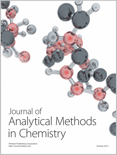
Journal of Analytical Methods in Chemistry
Empowering researchers with open access to cutting-edge findings.The Journal of Analytical Methods in Chemistry, published by HINDAWI LTD, stands as a premier platform dedicated to the dissemination of research in the vibrant field of analytical chemistry. With an ISSN of 2090-8865 and an E-ISSN of 2090-8873, this Open Access journal has been committed to providing unrestricted access to quality research since 1978, thereby fostering greater collaboration and innovation among researchers, professionals, and students globally. The journal showcases rigorous research insights spanning diverse categories, earning impressive Scopus rankings including Q2 in Chemical Engineering and Q3 in Analytical Chemistry for 2023, positioning itself effectively among respected peers. Its interdisciplinary approach also covers significant contributions in the realms of instrumentation and computer science applications, thus addressing contemporary challenges and advancements in analytical methodologies. By bridging theoretical underpinnings with practical applications, the Journal of Analytical Methods in Chemistry aims to catalyze knowledge exchange while enhancing the global discourse in analytical science.
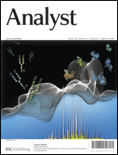
ANALYST
Driving Progress in Analytical Chemistry Since 1876ANALYST, published by the Royal Society of Chemistry, stands as a prestigious journal in the fields of Analytical Chemistry, Biochemistry, Electrochemistry, Environmental Chemistry, and Spectroscopy. Esteemed for its rigorous peer-review process and influential contributions to the advancement of scientific knowledge, the journal has been a vital resource for researchers and professionals since its inception in 1876. With an impressive Scopus ranking that places it in the top quartile for several chemical disciplines, it specifically ranks #12 in Spectroscopy and #31 in Analytical Chemistry, reflecting its robustness and relevance in the analytical sciences. Though currently not an Open Access publication, ANALYST provides valuable insights and cutting-edge research that help drive innovation and discovery in various scientific realms. Researchers and students alike will benefit from its commitment to disseminating high-quality research that addresses contemporary challenges and promotes interdisciplinary collaboration.

Separations
Innovating for a Cleaner, More Efficient WorldSeparations is a prestigious open-access journal published by MDPI, dedicated to advancing the fields of analytical chemistry and filtration and separation processes. Established in 2014, the journal has swiftly emerged as a significant platform for disseminating groundbreaking research and innovative methodologies in separation science, boasting an impressive E-ISSN of 2297-8739 and operating out of Basel, Switzerland. With its focus rotating from 2016 through 2024, Separations has been categorized in the Q3 quartile for both analytical chemistry and filtration and separation disciplines as of 2023, demonstrating its relevance in these scientific areas. The journal's rankings in Scopus, with 93rd out of 156 in analytical chemistry and 15th out of 19 in chemical engineering filtration and separation, reflect its commitment to high-quality research accessible to a global audience. Researchers, professionals, and students will find valuable insights and pioneering findings that foster collaboration and innovation within the vibrant community of separation science.

LCGC North America
Inspiring Progress in Analytical Chemistry Since 1999LCGC North America is a pivotal resource in the field of Analytical Chemistry, published by MJH Life Sciences. Since its inception in 1999, the journal has strived to bridge the gap between scientific research and practical applications, catering to a diverse audience that includes researchers, professionals, and students interested in chromatography and related analytical practices. Although currently categorized in the Q4 quartile of Analytical Chemistry, with a Scopus rank of #137 out of 156, LCGC North America is dedicated to delivering insightful articles that foster discussion and innovation within the analytical chemistry community. With a commitment to quality content, the journal covers a broad spectrum of topics, ensuring that readers remain informed about the latest developments and trends in the field. Despite its non-open access model, readers can access its valuable resources through institutional subscriptions and various library networks, making it a vital asset for those engaged in cutting-edge research and practice. Located in Cranbury, NJ, United States, LCGC North America continues to contribute significantly to the advancement of analytical methodologies and technologies.

CHROMATOGRAPHIA
Advancing the Frontiers of Chromatographic ScienceCHROMATOGRAPHIA is a renowned scholarly journal published by Springer Heidelberg, specializing in the field of analytical chemistry, biochemistry, and organic chemistry since its inception in 1968. With its ISSN 0009-5893 and E-ISSN 1612-1112, the journal has maintained a robust profile, currently ranking in the Q3 and Q4 quartiles within significant Chemistry categories. Aimed at researchers, professionals, and students, CHROMATOGRAPHIA serves as a critical platform for disseminating innovative research, methodologies, and advancements related to chromatography and its applications in various scientific fields. While the journal is not open access, it offers significant visibility and scholarly contribution opportunities, making it an essential resource for those engaged in the vibrant intersection of chemistry and biochemistry.
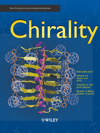
CHIRALITY
Connecting Researchers to the Heart of Chiral StudiesCHIRALITY is a prominent journal in the field of chemistry, published by Wiley. Established in 1989, it has become a critical resource for researchers and professionals interested in the intricate study of chiral compounds across various applications, including analytical chemistry, catalysis, drug discovery, organic chemistry, pharmacology, and spectroscopy. With an ISSN of 0899-0042 and an E-ISSN of 1520-636X, CHIRALITY currently holds a Q2 ranking in Analytical Chemistry and Q3 rankings in several other categories based on the latest assessments. Although it does not offer open access, the journal is widely recognized for disseminating high-quality research that contributes significantly to our understanding of chirality. Its impact is reflected in its Scopus rankings, indicating the journal's influence and relevance within the broader scientific community. Researchers, students, and professionals alike will find CHIRALITY an invaluable conduit for cutting-edge findings and developments in chirality-related research.

Acta Chemica Iasi
Pioneering New Frontiers in Chemical InquiryActa Chemica Iasi is a distinguished open-access journal dedicated to advancing the field of chemistry, published by the esteemed ALEXANDRU IOAN CUZA UNIVERSITY PRESS located in Iasi, Romania. Since its inception, this journal has served as a vital platform for the dissemination of significant research findings, theoretical advancements, and methodological innovations in various chemistry disciplines. As an open-access publication since 2013, it provides unrestricted access to high-quality articles, fostering collaboration and knowledge sharing among researchers, professionals, and students globally. Although specific metrics such as H-Index and Scopus rankings may be forthcoming, the journal's commitment to rigor and excellence ensures that it remains an invaluable resource for those seeking to stay at the forefront of chemical research. With a focus on promoting scientific inquiry and innovation, Acta Chemica Iasi continues to uphold a legacy of scholarly excellence and contribution to the chemical sciences.

CHINESE JOURNAL OF ANALYTICAL CHEMISTRY
Pioneering Innovations in Analytical TechniquesCHINESE JOURNAL OF ANALYTICAL CHEMISTRY, published by SCIENCE PRESS in China, stands as a prominent platform in the field of analytical chemistry since its inception in 1989. With its ISSN 0253-3820 and E-ISSN 1872-2040, the journal maintains a vital role in disseminating empirical research and innovative methodologies, contributing to the advancement of analytical techniques and their applications. The 2023 Scopus ranking positions the journal in the third quartile (Q3) within its category, reflecting a respectable standing among its peers. Researchers, professionals, and students alike engage with a broad range of topics, from instrumental analysis to environmental monitoring, each aiming to foster further scientific inquiry. Although it does not currently offer Open Access, the journal's rich repository of knowledge continues to be an essential resource for those in the analytical chemistry community, with an enduring commitment to scientific excellence and collaboration.

JOURNAL OF ANALYTICAL CHEMISTRY
Advancing the Frontiers of Analytical KnowledgeJOURNAL OF ANALYTICAL CHEMISTRY, published by PLEIADES PUBLISHING INC, stands as a pivotal resource in the field of analytical chemistry, offering an innovative platform for researchers, professionals, and students to advance their knowledge and contribute to the discourse within the discipline. With an ISSN of 1061-9348 and an E-ISSN of 1608-3199, this journal features a focused exploration of analytical methodologies, instrumentation developments, and applications across various domains, contributing to practical and theoretical advancements in the field. Currently ranked in the Q3 category in Analytical Chemistry with a Scopus rank of #111 out of 156, it provides critical insights and innovation strategies for professionals aiming to enhance their analytical capabilities. Access to the journal is through standard subscription models, and it covers an extensive range of topics pertinent to the discipline from 1996 to 2024. Engage with the JOURNAL OF ANALYTICAL CHEMISTRY to be part of a vibrant research community dedicated to push the boundaries of analytical practices.
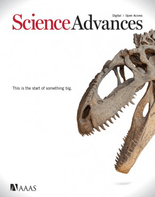
Science Advances
Pioneering Insights for a Brighter Scientific FutureScience Advances, published by the American Association for the Advancement of Science, is a leading open-access journal in the field of multidisciplinary sciences. Since its inception in 2015, it has rapidly gained prominence, achieving a remarkable Q1 ranking in both Medicine (miscellaneous) and Multidisciplinary categories, underlining its impact and relevance in contemporary research. With an impressive Scopus ranking of #7 out of 171 in the Multidisciplinary field, it proudly sits in the 96th percentile, showcasing its dedication to disseminating high-quality research across various scientific domains. This journal not only provides open access to innovative findings but also aims to foster collaboration and maintain a high standard of scholarly communication among researchers, professionals, and students globally. Stay updated with some of the most groundbreaking advancements and contribute to the collective pursuit of scientific knowledge through Science Advances.